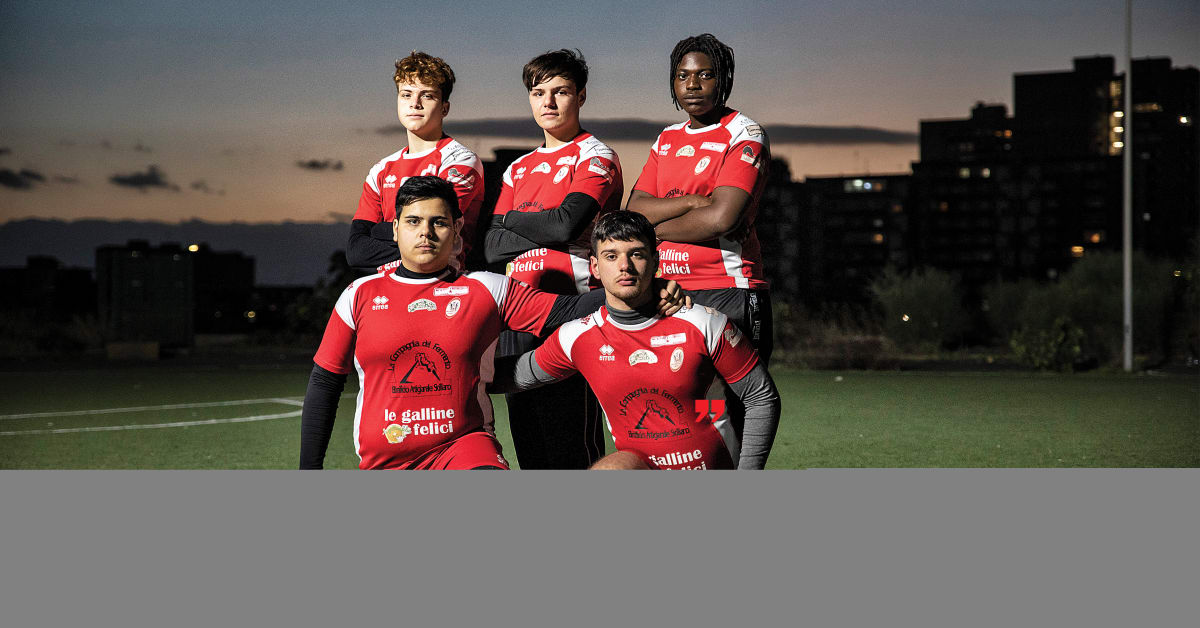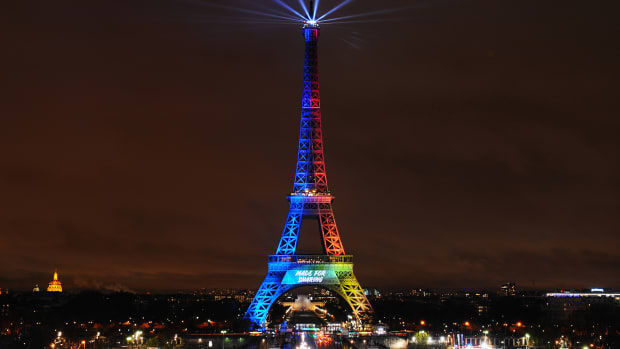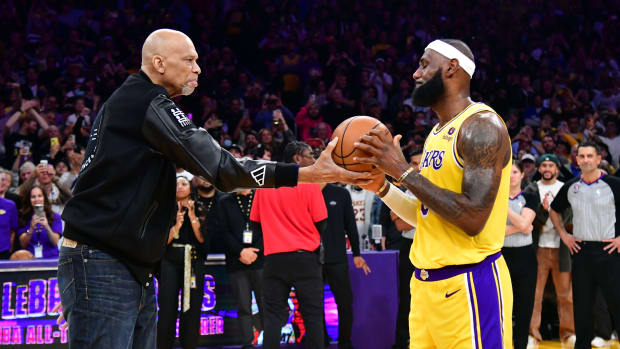Fifteen minutes into the biggest game of his life, Alessio Panebianco saw the looks in his teammates’ eyes and realized: We’re gonna lose.
This was on a sunny afternoon in December at the Stadio Giuseppe Rizzo in Catania, Sicily, at the foot of Mount Etna. Panebianco’s team, Briganti di Librino, was in its first-ever playoff, against San Gregorio, and the winner would climb to the third tier of Italy’s rugby pyramid, Serie B.
Victory, though, would mean more than just deliverance to a higher division—it would be salvation from a year when Briganti came under siege from sinister outside forces. The club fields boys and girls teams at almost every age level, providing those players with a crucial path away from criminal activity. And that outlet, it seems, has not gone over particularly well with Sicily’s feared Mafia, the Cosa Nostra. Because the club offers an alternative to mob life, “they hate Briganti,” says Simone Olivelli, a crime reporter with Italy’s MeridioNews.
Briganti’s staff has been threatened and has seen equipment stolen. Last May assailants sneaked around the back of Briganti’s half-finished San Teodoro Stadium and torched the team bus. Soon afterward, somebody fired two bullets into the wall of Briganti’s gym. Players from the senior men’s and women’s teams were now putting in night shifts to defend the San Teodoro from mobsters.
Briganti’s biggest match would therefore take place in exile, 10 miles to the north, in a modest little village that in no way resembles the club’s home neighborhood of Librino, a sprawling high-rise district—“Catania’s Bronx”—that ranks among Europe’s poorest.
Panebianco, 22 and short, with a military fade and limbs like dirigibles, expected these hardships would galvanize his teammates against San Gregorio, which they had already steamrolled 49–14 in the regular season. And with 80-odd fans cheering them on from the Rizzo’s shallow bleachers, Briganti started well, repelling its rival’s attacks in wave after wave of crunching tackles.
But offensively Briganti lumbered. Players threw away possession and rarely threatened a try, rugby’s touchdown. San Gregorio kicked one three-point penalty, then, in the second half, another. Rather than release Briganti, the pressures of the day were strangling the club into unforced errors and turnovers. Panebianco, a gifted attacker, barely saw the ball. Briganti scored a consolation try, but when the match finished 6–5, he understood that mentally his team was a work in progress.
At first Panebianco had seen complacency in this result, as if Briganti had already written a triumphant ending into the story of its annus horribilis. But he managed to look past the sting. His team’s presence, he knew, was salvation alone, from poverty and from an underworld that has ruled Sicily for centuries. Win or lose, Panebianco knew that without rugby his life could have taken a far darker path.
Riccardo Panebianco moved his growing family from their home in Catania to Wiesbaden, Germany, near Frankfurt, in 1999. A year later, his wife, Antonella, gave birth to their fourth child, Alessio, and for a while they lived frugally but well off Riccardo’s construction-worker salary.
But eventually Riccardo’s job fell through—and one more child arrived—so in 2006 the Panebiancos, with no other choice, returned to Italy. They crammed into a small unit on the eighth floor of a giant, magnolia-colored apartment block, right where Librino meets the Sicilian countryside.
Librino was no Frankfurt. Its 70,000 residents had no high school, and most stores were shuttered. Every other adult was jobless. Buildings not four decades old lay in ruin. Attenuated palms lined the median of the Panebiancos’ street, Viale Moncada, and through these palms young Alessio Panebianco stared out to the Mediterranean Sea, imagining he was somewhere remote and exotic.
It was a dream easily shattered. The street below was potholed. The neighbors tossed trash and old furniture out of their apartment windows. It was as if the entire neighborhood had fallen down, and nobody had bothered to pick it back up.
Librino began very differently. Kenzō Tange, one of the most influential architects of the 20th century, developed the cluster of high-rises in 1969, envisioning a utopian satellite for Catanians who’d suffered wartime ruin under Benito Mussolini. He plotted homes for 100,000 people across a series of concentric rings, in the middle of which would sit stores, a cinema and a swimming pool. Catania’s nearby airport and a highway connecting Librino to other major cities would link up with ample employment opportunities.
But throughout the 1970s, Italy was slammed by economic crises, unemployment and far-left and far-right terrorism. Industry on Sicily died, and Librino’s transport links never materialized. Nor did the cinema or the pool. In the end, Librino “was not a happy place,” says Paolo Romania, an artist and early resident. Instead, the mob moved in. But the Cosa Nostra of the ’70s and ’80s was nothing like the pinstriped Corleone clan of Mario Puzo’s The Godfather. They were tracksuit-wearing, drug-smuggling thugs who murdered thousands in a series of wars and bombing campaigns across the era.
Finally, in 1986, Sicilian authorities cracked down and conducted the world’s largest trial, at a special-made bunker inside of a Palermo prison. By ’92 prosecutors had convicted 338 of the so-called Maxi Trial’s 475 defendants.
Later that year, mob assassins murdered those prosecutors, shocking Sicilians, but the deaths were the last convulsions of an underworld on its knees. In the following years the island’s Mafia grew more diffuse, with a growing income divide. Wealthier mobsters moved into white-collar crimes such as construction, political corruption and gas-smuggling, from nearby Libya. Small-time crooks battled for scraps in poor local markets, such as Librino, peddling stolen goods and drugs through kids, who stood to face only reduced juvenile prison terms.
By 2010, when Panebianco was approaching his teen years, Librino was drowning in opioids. His building was known as an easy score, and he often witnessed shootings and police raids. One day, amid a turf war between rival clans, mobsters set fire to the door of his brother’s apartment.
Librino would eventually get a high school, but dropout rates were, and remain, among the highest on the continent. “Where the state does not offer training and education,” read a recent report by Catania’s anti-Mafia commission, “organized crime does, with a system of seduction, values and recruitment that marks children’s destinies forever.”
The Mafia hired several of Panebianco’s school friends to work corners, but he resisted. “Most of the time I stayed home,” he says. “Because: Hanging around? It’s not a good thing.”
Back then Panebianco devoted his free time to calcio, or soccer; rugby was just some game enjoyed hundreds of miles away, in frigid northern cities such as Milan and Parma—or farther away, in France and Ireland and England. Only a handful of sides played rugby in Sicily. But in 2012, while searching for a spot to kick around, Panebianco and his friends stumbled upon a group of people tossing an oval-shaped ball on the field of an old, abandoned sporting complex. That complex was the San Teodoro. The club was named Briganti, or “the Brigands.” They took the boys in, and Panebianco played rugby for the first time.
“I completely fell in love with the game,” he says.
Briganti’s coach and president at that time was Piero Mancuso, a middle-aged agronomist with salt-and-pepper sideburns and a bushy Van Dyke beard, and who had lived in Librino since 1993. He first brought a rugby ball to the meeting of a Librino social club in 2006, but his project didn’t come to full fruition until six years later, after unknown assailants ran a 13-year-old club member, Giuseppe Cunsolo, off the road on his moped, killing him.
Friends believed that Cunsolo had fallen in with the Mafia, and Briganti would aim to prevent others from following that route. Members named their clubhouse after the slain teen, and they welcomed boys and girls from as young as 5, all the way up to senior men and women. They cleaved an explicitly antiracist, antifascist political line, but their name was decidedly bellicose, borrowed from a Calabrian folk song called “Briganti Se More” (or, roughly, “To Die a Brigand”). The land is ours, and nobody can touch it, goes one line. Let’s make our enemy tremble.
Mancuso knew what he was up against, and he chose his sport carefully. He could have taught kids soccer, overwhelmingly Sicily’s most popular pastime—but soccer has a long and sordid history with the Mafia. Members of Naples’s Camorra crime syndicate plied Diego Maradona with drugs and sex workers during the 1980s. Sicily’s two biggest sides, Palermo and Catania, have long stood accused of Mafia ties. And in November, former Palermo captain Fabrizio Miccoli was sentenced to three and a half years in prison for commissioning a Cosa Nostra mobster to recover a friend’s debt.
Mancuso was also wary of soccer’s on-field culture, which rewards flops and theatricality, and which centers on an obsession with individual talent. In contrast, a well-timed juke or kick may break a rugby team’s barricades, but no ball reaches the opposing try line without everybody’s involvement.
Soccer is balletic and Brownian. Rugby is trench warfare. “We’re in a society that is individualistic—a performance,” says Mancuso. “In rugby, you need to look at what you have around you. It’s not enough to have very good players. You also have to work together.”
Nowhere is that ethos better distilled than in one of rugby’s key moments, the ruck, where a tackled player must release the ball and wait for teammates to grab or contest it, often in the form of a bone-crunching shoulder charge. Stricken players have to get back up and go again. “If you fall,” says Gloria Mertoli, the captain of Briganti’s senior women’s team, “[teammates] will help you back up. This is like life. . . . You fall down, you get up—and you continue.”
Mancuso applied this maxim at the San Teodoro, a former potato field that had been repurposed for the 1997 World University Games but was never used. Denied in his initial petition to the city for control of the abandoned grounds, he pushed on, unfazed. Finally, on April 25, 2012—32 years to the day after Italy was liberated from fascism—Mancuso declared the San Teodoro to be Briganti’s official home, paperwork be damned. They would be squatters. The club built a kitchen, a library and a café. Membership fees were instituted, but they were (and remain) voluntary.
Mancuso’s club, as he built it, would embrace the power of sport to be, as the UN has said, “an important enabler of sustainable development . . . and peace in its promotion of tolerance and respect.”
Still, not every brigand has avoided the pull of organized crime.

Briganti’s players find community at the San Teodoro, and in its kitchen-library-café space.
Alessio Mamo
Giosue di Prima met Mancuso shortly before moving to Librino in 2014, at age 16. His father was doing a 15-year stretch in prison for attempted murder, and his mother worked all day and night as a cleaner. Eventually di Prima would make Briganti’s first team—but then he got bored and dropped out of school. Men with fast cars and nice watches asked whether he wanted to pull off some robberies for them.
Before long, di Prima was deeply entangled in the criminal world, and those elements found their way onto the rugby field. During one game, in the southern town of Agrigento, he attacked a teammate and left the boy in a coma for three days. Attempted murder charges were lessened to assault, but he was banned from playing any contact sport on Sicily. (Around the same time, di Prima was also involved in and convicted of committing a robbery.) Ultimately he left Briganti.
As di Prima tells it, it was as if he’d been cruising down a highway, then suddenly found himself heading into oncoming traffic. “It was really stupid,” he says of the assault. “But at that moment, the only thing I could think was: Al diavolo tutti.” (In essence: F--- it.)
Panebianco knows di Prima’s story as a cautionary tale. In 2018, at 18, Panebianco graduated from Carlo Gemmellaro High—he was the only one of his siblings to have continued his education that far—and with job prospects slim he focused on a dream career in rugby. Italy’s national academy drafted him that year. But the academy’s funding dried up, and Panebianco left soon after without having played a competitive match. He returned to Briganti.
In his absence, the club faced its greatest challenge to date. Catania had finally, formally, given Mancuso the right to play at the San Teodoro. But at midnight on Jan. 11, 2018, a blaze broke out in the Giuseppe Cunsolo clubhouse, destroying almost everything inside: shirts, equipment, books, computers. Authorities never officially connected the fire to the Cosa Nostra, who rely heavily on arson as an intimidation tactic, but to Briganti it was a clear message from the mob: We run Librino.
If club members were intimidated, they didn’t show it. The following day, almost every player showed up to train, running drills up and down the San Teodoro’s concrete bleachers and clearing up the mess. Teams from all over the world donated money toward a rebuild. “The fire was a kind of second liberation of this place,” says Marta Mazzucchelli, who plays for the women’s first team. “Our motto was that this would be more beautiful than before. They set fire to our home? We must react.”

When the Cunsolo clubhouse burned down, players approached it like they do their sport: “You fall down, you get up,” says Mertoli.
Alessio Mamo
Today the Giuseppe Cunsolo clubhouse is padlocked, its insides charred black. But beside it, overlooking the San Teodoro field, sit two giant hangars connected by a corridor. One is filled with gym equipment. The other has been transformed into a combination café, library, school and youth club. Murals celebrate that library’s namesake, Iqbal Masih, a Pakistani labor rights activist, and a commitment to environmentalism. On one wall is painted LOVE RUGBY / HATE RACISM.
The field itself is perched on a slope looking down on the Sicilian coastline. Planes take off and land to one side; the other is surrounded by project blocks. On clear days you can see Etna, which still blows regularly, between crumbling rooftops. Only on rare nights is the club empty. More than one player describes Briganti as their “happy place.”
In 2019, Briganti embarked on an ambitious project to replace its patchy grass field with artificial turf. Goals were set of marrying the club’s social mission with on-field success. But the COVID-19 pandemic slowed work—authorities ultimately banned amateur contact sports for more than a year—and contractors failed to deliver on labor and materials. Club members, rattled by past incidents, feared the mob was pressuring suppliers to sabotage the project.
Last April, somebody kicked down the reimagined clubhouse’s iron door and stole equipment. Not long after that came the attack on the bus (the burned remains of which still sit beside the field) and the bullet holes in the gymnasium wall. “The Mafia showed us in an explicit way that they don’t like us,” says Mancuso. “Working in this neighborhood, this is one of the things you can expect. It’s part of being here. But every time we were hit by an attack, it encouraged us to do more.
“We are not saviors,” he says of himself and his fellow coaches. “We just do this to help the [players]. Just because you’re born [in Librino] doesn’t mean the end. You can have choices. Rugby opens the window on that journey.”
During the pandemic, Mancuso decided he would let a younger generation lead Briganti. Mirko Saraceno, who has been with Briganti since he was 13, was named the club’s president in July 2020. He’s 24, with a stern, bespectacled face and legs that fire like pistons. “The mission is to communicate with these guys through rugby,” he says. “I always tell them: Perhaps you will not become the champions of the world. But you will grow up; you’ll fall down and get back up.
“Especially in this neighborhood,” he adds, “the challenge is letting them know they can do it.”
Saraceno and his brigands remain vigilant. They put in regular night shifts to guard the San Teodoro, patrolling its perimeter every 15 minutes. A couple of months ago, he and his partner, Mazzucchelli, were in the clubhouse during one such shift when they heard a loud knocking. At the door they found 10 guys who claimed to be looking for a friend. The next morning they discovered that a large chunk of turf had been rolled up, ready to steal.

With the U-17 boys team, as with everyone else, Mancuso (in black) pushes the core of rugby: “It’s not enough to have very good players. You also have to work together.”
Alessio Mamo
“We think they were trying to see if there was really someone inside, or if they could act undisturbed,” says Mazzucchelli. “Obviously, that scared us.” Otherwise, she says, Briganti staff and players have remained unfazed by the constant criminal threats.
Alessio Panebianco has lost dozens of acquaintances to drugs and crime over the years. In 2020, Mafiosi murdered one of his friend’s brothers and hid the body. But from a longer view, things are looking up. For starters, there are fewer drugs on the street. Panebianco, for his part, gets to coach kids almost every day, and in February his club christened its new, artificial-turf pitch. His dream of playing top-level professional rugby may be ebbing away, but he has goals of pursuing an economics degree. Looking forward, he hopes that, as Briganti matures, the Mafia will accept the rugby club as a part of Catania’s city culture.
Panebianco still hurts from December’s playoff loss. That negative, however, is nothing compared with the positives of life away from the mob. “Of course my parents played a part,” he says of his upbringing, “but 80% of what I am today is Briganti. Sometimes I wonder how my life would have been without it, and I imagine it very dark, without light.
“Briganti is the light.”
Read more of SI’s Daily Cover stories:
• A Truck Drove Onto a Golf Course, With Two Dead Bodies Inside ...
• Behind the Spectacle of Colin Kaepernick’s Comeback Tour
• These Two Former NBA Players Won Gold for the USSR. Now They’re Trying to Save Kids From Russian Attack








